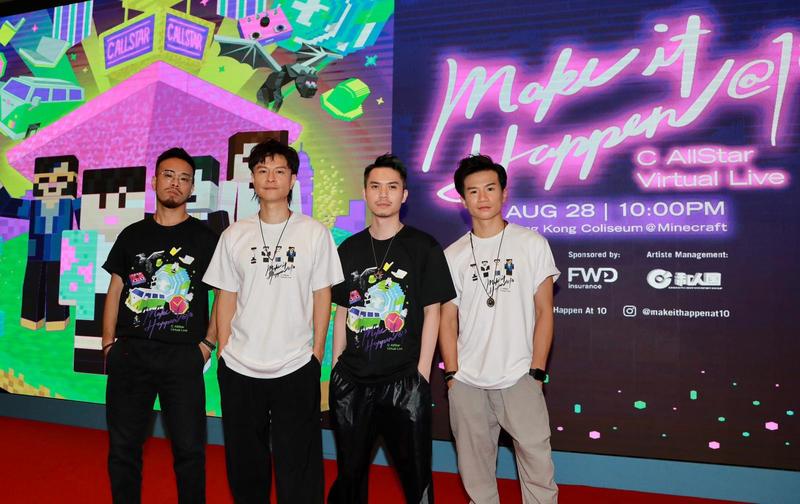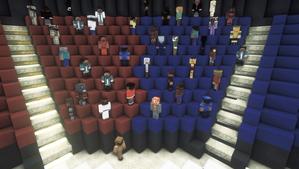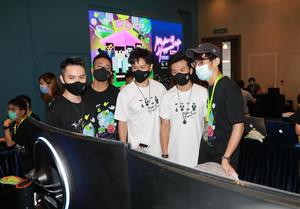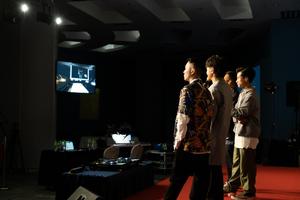By combining video games with live concerts, the digital generation is trying to create a brand-new entertainment experience for those at home. And the business has just started in Hong Kong. He Shusi reports.
 Members of C Allstar pose for a photo with billboards of their in-game concert. (PHOTO PROVIDED TO CHINA DAILY)
Members of C Allstar pose for a photo with billboards of their in-game concert. (PHOTO PROVIDED TO CHINA DAILY)
Live music is almost non-existent in Hong Kong these days as COVID-19 continues to unleash its fury. But how about cosplaying yourself in a virtual stadium and interacting with others in a video game? The answer lies in a new form of business — in-game concerts.
A virtual Hong Kong Coliseum — the city’s showcase pop concert stadium — was built with every detail of a live concert packed in, from on-site ticket checking, body temperature measuring to seat searching, utilizing Microsoft’s flagship open-world game, Minecraft.
The pandemic has increased people’s acceptance of online cultural activities, allowing the virtual world to enter the entertainment sector one or two years early
Gary Chan, executive director of Media Asia Group
It’s no work of fiction. In August last year, popular four-member boy group, C AllStar, held Asia’s first in-game concert at the virtual Hong Kong Coliseum, incarnating Minecraft game characters.
Minecraft is one of the most popular open-world games in existence. By creating a virtual world and exploring it, players can simulate the real world.
To give the home-based audience a sense of participation, the organizer spent three months re-creating the classic “four-sided stage” on Minecraft. The audience could get a close-up view of the scenes, such as the stage lifting and the elaborate stage effect. If any member of the audience were to exude a fierce response, he or she would be driven out of the coliseum by “security”.
To further enhance the ambience at the concert, the virtual event deployed the digital collaboration tool and cloud technology to place all fans on a video call in a shared virtual background, creating a chorus effect between the audience and C AllStar.
Implanting e-commerce as well, the organizer prepared booths for sponsors to sell goods outside the “coliseum”, including physical goods and virtual goods to be used at the concert, such as glow sticks and virtual fireworks.
 Audience members take their seats at the virtual Hong Kong Coliseum. (PHOTO PROVIDED TO CHINA DAILY)
Audience members take their seats at the virtual Hong Kong Coliseum. (PHOTO PROVIDED TO CHINA DAILY)
According to organizer, Kre8Lab, the event’s sponsorship reached HK$100,000 (US$12,883). Except for FWD and Microsoft, it also drew the attention of McDonald’s, Watsons, Deliveroo and others.
Some 60 percent of participants were C AllStar fans while the rest were game fans of Minecraft. Members of the audience could choose to only purchase the ticket for HK$48 or a ticket, plus a redemption code of a Minecraft account, which enabled a full virtual experience at HK$248. More than 90 percent of participants chose to embrace the latter innovation, according to Chan Ming-yen, assistant marketing manager with Kre8Lab.
To help new players familiarize themselves with the Minecraft game, the production team also created the “Super Avenue of Stars” to restore the real streets of Tsim Sha Tsui, including the Clock Tower, the Star Ferry Pier and the Hong Kong Cultural Centre.
The concert managed to draw about 9,500 participants and raked in HK$350,000 in revenue from ticket and merchandize sales. The cost of the virtual concert was similar to that of a real one, Chan said.
Kre8Lab is a subsidiary of Hong Kong leading entertainment company Media Asia Group. The lab aims to provide experimental and creative prototypes of digital entertainment.
The cross-sector event also got support from tech incubator Cyberport in reaching out to the e-sports community. The “builders” of the virtual stadium were all mature players of Minecraft, some recruited through video game BBS. It created about 100 part-time jobs in Hong Kong during the pandemic, according to Chan.
 Exterior look of the virtual Hong Kong Coliseum. (PHOTO PROVIDED TO CHINA DAILY)
Exterior look of the virtual Hong Kong Coliseum. (PHOTO PROVIDED TO CHINA DAILY)
Although the event didn’t make a profit, Chan stressed that the purpose was to find new prototypes for digital entertainment to provide fans with fresh experiences in this difficult time.
Following the concert, he said there have been inquiries from other companies about building a Minecraft stage for their events, including a skincare firm that asked about its in-house dinner gathering for 5,000 people.
There are many application scenarios for the prototype, from conferences and concerts to exhibitions and dinner gatherings, said Chan. There’s no limit on the number of participants in the virtual world so, basically, it can cater to any event as long as it is a gathering, he said.
The entire project, called “The Show Must Go On”, included virtual concerts, a digital entertainment talent workshop and a digital talent show. Lasting four months, it not only provided fans with a new digital entertainment experience, but it also cultivated digital entertainment talent for the industry, Chan said.
The first workshop in Hong Kong attracted 150 students, prompting Chan to say, “We aim to pass down the experience of digital entertainment and the combination of livestreaming, games and music.”
Gary Chan, executive director of Media Asia, said, “The virtual performance model will be part of the entertainment industry in future. There’s no glass ceiling in this market. The pandemic has increased people’s acceptance of online cultural activities, allowing the virtual world to enter the entertainment sector one or two years early.”
Under the “new normal”, industries need to be flexible in adapting to new jobs and lifestyles, said Kevin Tse, director of the partner and business division at Microsoft Hong Kong. He said the company will continue to empower the entertainment business in pioneering innovative entertainment experiences and other possibilities under the “new normal”.
 Virtual characters of C Allstar members in Minecraft. (PHOTO PROVIDED TO CHINA DAILY)
Virtual characters of C Allstar members in Minecraft. (PHOTO PROVIDED TO CHINA DAILY)
Leveraging gaming tech
Cecilia Yau, PwC media leader for the Chinease mainland and Hong Kong, said video game technologies and their extended partners have long led the way when it comes to virtual events. As people get more accustomed to playing and watching others play, it’s a natural transition for them to construct virtual events around these technologies.
Leveraging gaming technology allows producers to create higher quality content with interactive elements, like styling avatars or choosing storylines, on lower budgets without the need for physical event spaces, she said.
Before C Allstar’s Minecraft concert in Hong Kong, Yau noted American rapper Travis Scott’s record-breaking virtual concert that was held in April on the online video game, Fortnite. The nine-minute digital concert reportedly reached 27.7 million unique players and saw 12.3 million concurrent users in the game.
“This is incredibly impressive when you compare it to Scott’s Astroworld Tour, which saw him reach just over 700,000 fans for one year,” said Yau.
“The key lesson we can learn from these partnerships is that they not only provide a uniqueness and differentiation factor, they can help cross-pollinate the two fan bases of both parties, creating overall synergy and allowing each to build on the success of the other,” she stressed.
According to PwC’s Global Entertainment & Media Outlook 2020-2024, Hong Kong’s over-the-top media services are predicted to bypass traditional TV and video by 2024 with projected revenue of US$373 million.
The time horizon allows companies to change revenue models and forge partnerships with digital entertainment, video gaming or technology firms to enhance content, platforms and overall user experience, said Yau.
 The director of the virtual concert explains to performers how the event will work. (PHOTO PROVIDED TO CHINA DAILY)
The director of the virtual concert explains to performers how the event will work. (PHOTO PROVIDED TO CHINA DAILY)
Building connectivity creatively
However, the downside is that it may not bring the same level of return for companies measured in consumer engagement and the return of new users to the game. Even with corporate and brand sponsors, the loss of revenue on concessions and merchandise from live events will lower profit margins and scale of advertising. This, in turn, will affect the level of investment that such events can receive, she said.
If virtual entertainment events are to continue as the “new normal” for now, the organizers need to double down on their marketing and promotional efforts. Just because you have a captive audience does not mean they’re automatically going to find you and spread the word, she said.
“From an experiential standpoint, we lose certain elements of the live experience when things go virtual. We can’t simply ignore them,” she said. “The problem is not the lack of opportunity to connect but a lack of creativity in building engagement from one-time to frequent users.”
For virtual events to stand out, companies need to employ new technologies like virtual reality or augmented reality to create an interactive, and personalized element, such as being able to vote on a show list, location or theme the artist would perform in — actions that give fans more control and interactive content.
If consumers get the impression that what’s being offered to them is only temporary, they’ll quickly “log-off”, she warned.
 C Allstar go onstage virtually at the concert created in Minecraft. (PHOTO PROVIDED TO CHINA DAILY)
C Allstar go onstage virtually at the concert created in Minecraft. (PHOTO PROVIDED TO CHINA DAILY)
From a content development point of view, developing a fully immersive experience through interactive content is key to enhancing user connectivity to other players or artists and creating a sense of value for money. Companies have to capture the right price-to-experience point to justify entry prices, encourage player purchases of in-game items and refer friends to join virtual events, she said.
With COVID-19 still threatening to blight business opportunities, Hong Kong’s media industry must reconfigure ways to build new business models to be ready when the acceleration of digitalized entertainment becomes the norm, urged Yau.
PwC’s latest research found that the video-games sector is the third-fastest growing segment in Hong Kong, predicting its revenue would hit US$1.1 billion by 2024 at a 6.2 percent compound annual growth rate.
Noting that Hong Kong has been a renowned regional hub for entertainment, concerts and sporting competitions, Yau reckons that the city still lacks a creative talent pool to support the entertainment business’ long-term development, compared to countries like Singapore, which has surpassed Hong Kong as a tech hub in Asia, boosted by internet giants setting up regional headquarters there.
Hong Kong can leverage its geographical advantages and proximity to the Chinese mainland and benefit from the pandemic-led growth spurt in industries like gaming, she said.
Contact the writer at heshusi@chinadailyhk.com


